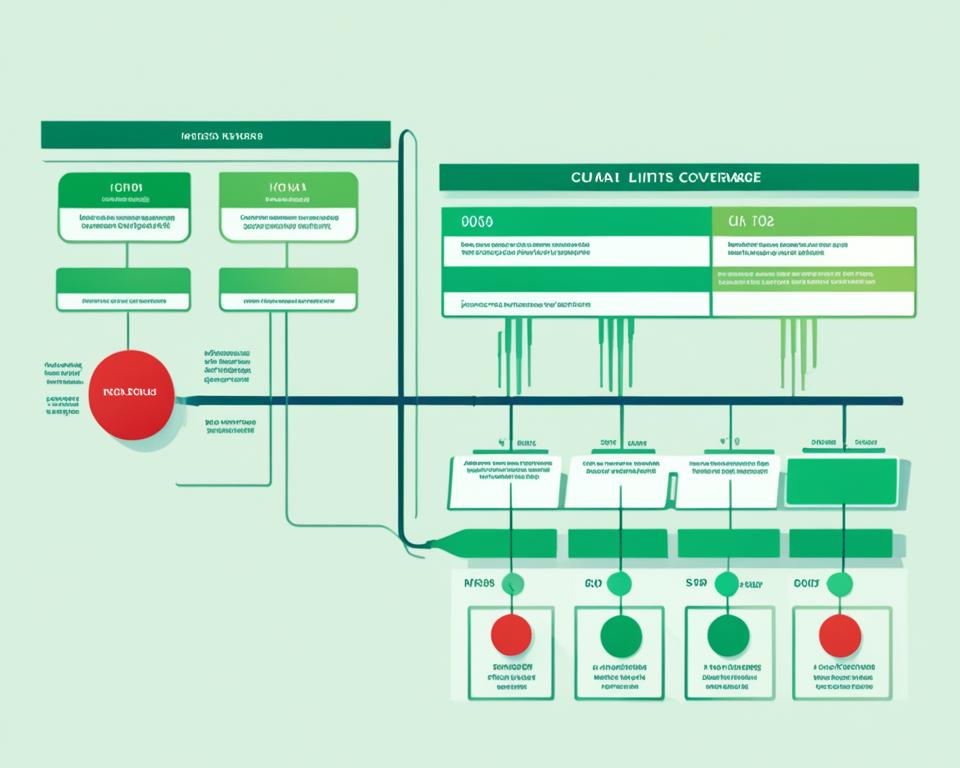If you’re considering opening an account with a credit union, you may be wondering about the insurance coverage they provide. Unlike traditional banks, credit unions are not FDIC-insured. However, that doesn’t mean your funds are unprotected. Credit unions have their own form of deposit insurance provided by the National Credit Union Administration (NCUA).
The NCUA offers federal share insurance, which protects credit union members’ accounts up to $250,000 per depositor per account. This means that if your credit union fails, your deposits are insured by the NCUA to the coverage limit. For example, if you have $150,000 in your checking account and $100,000 in your savings account, both accounts would be fully insured.
Understanding credit union insurance coverage is essential for every account holder. In this article, we’ll explore the difference between FDIC and NCUA insurance, the types of accounts covered by NCUA insurance, and how NCUA insurance works. Let’s dive in!
Key Takeaways:
- Credit unions are not FDIC-insured but are protected by the NCUA.
- The NCUA provides up to $250,000 of coverage per depositor per account in most credit unions.
- NCUA insurance covers various types of accounts, including checking accounts, savings accounts, and certificates of deposit.
- NCUA insurance does not cover investments such as mutual funds, stocks, bonds, or life insurance policies.
- NCUA insurance automatically protects account holders at federally insured credit unions, with no need to apply for coverage.
What is FDIC Insurance?
FDIC insurance plays a crucial role in protecting bank customers in the event of a bank failure. It provides an important safety net, giving customers peace of mind and financial security. This section will delve into the specifics of FDIC insurance, its coverage, and the types of accounts it protects.
FDIC Insurance Coverage:
FDIC insurance offers coverage of up to $250,000 per depositor in the event of a bank failure. This means that if you have multiple accounts with the same bank, they are collectively insured up to the $250,000 limit. The coverage applies to a wide range of accounts, including:
- Checking accounts
- Savings accounts
- Money market deposit accounts
- Certificates of deposit
- Certain other accounts
Note: It’s important to remember that FDIC insurance only covers bank accounts and does not extend to credit union accounts.
What is NCUA Insurance?
The National Credit Union Administration (NCUA) plays a crucial role in overseeing and insuring credit unions in the United States. As an independent federal agency, the NCUA ensures the safety and security of credit union deposits through its National Credit Union Share Insurance Fund (NCUSIF).
The NCUSIF provides up to $250,000 of coverage per depositor, giving members peace of mind and financial protection. This insurance applies to a variety of account types, including individual accounts, joint accounts, retirement accounts, and select other accounts at federally insured credit unions.
NCUA Insurance Coverage Limits:
| Account Type | Coverage Limit |
|---|---|
| Individual Accounts | $250,000 per depositor |
| Joint Accounts | $250,000 per co-owner |
| Retirement Accounts | $250,000 per depositor |
| Other Covered Accounts* | $250,000 per depositor |
*Certain other types of accounts are also covered by NCUA insurance. Contact your credit union for more information about the specific account types covered.
With NCUA insurance, credit union members can rest assured that their deposits are protected, even in the event of a credit union failure. The NCUA works diligently to regulate and maintain the stability of the credit union industry, ensuring the safety of member funds.
“NCUA insurance provides vital protection for credit union members and reinforces the trust and confidence in the credit union system.” – John N. Magill
By providing deposit insurance, the NCUA aims to promote a secure financial environment where credit union members can save, invest, and access financial services with peace of mind. Whether you have an individual account, joint account, retirement account, or another covered account, NCUA insurance offers robust protection for your hard-earned money.
What Types of Accounts are Covered by NCUA Insurance?
NCUA insurance provides protection for a range of accounts at federally insured credit unions, ensuring the financial security of their members. The coverage extends to:
- Checking accounts
- Savings accounts
- Money market accounts
- Certificates of deposit
- Certain other accounts
In addition to individual accounts, NCUA insurance also covers joint accounts, retirement accounts, and trusts.
However, it’s important to note that NCUA insurance does not extend to investments such as mutual funds, stocks, bonds, or life insurance policies.
NCUA Insurance Coverage
| Account Type | Covered |
|---|---|
| Checking accounts | Yes |
| Savings accounts | Yes |
| Money market accounts | Yes |
| Certificates of deposit | Yes |
| Certain other accounts | Yes |
| Joint accounts | Yes |
| Retirement accounts | Yes |
| Trusts | Yes |
| Mutual funds | No |
| Stocks | No |
| Bonds | No |
| Life insurance policies | No |
How Does NCUA Insurance Work?
NCUA insurance plays a crucial role in ensuring the financial security of credit union account holders. It offers automatic protection to individuals who have accounts with federally insured credit unions. Understanding how NCUA insurance works is essential for anyone seeking peace of mind and confidence in their financial investments.
When you open an account at a federally insured credit union, you are automatically covered by NCUA insurance. There is no need to apply separately for coverage, as it is provided to all eligible account holders. The standard insurance amount is $250,000 per depositor, per account, which means each individual is insured up to this amount for each account they hold.
It’s important to note that if you have multiple accounts at the same credit union, they are collectively insured up to $250,000. For example, if you have a checking account with a balance of $150,000 and a savings account with a balance of $100,000, both accounts are fully insured, as they fall within the coverage limit.
In the event that your credit union fails, the NCUA steps in to manage and close the institution. They work diligently to ensure the return of funds to account owners, providing a safety net to safeguard your financial assets. This process offers significant reassurance, knowing that even in the worst-case scenario, your money is protected and can be recovered.
NCUA insurance operates under the supervision of the National Credit Union Administration, an independent federal agency. Their primary goal is to regulate and insure credit unions, promoting financial stability within the industry. By insuring deposits, the NCUA enhances the confidence of credit union members and reinforces the reputation of these institutions as reliable and secure.
NCUA insurance not only provides peace of mind but also underscores the importance of credit unions as a sound financial choice. The insurance coverage aligns with the mission of credit unions, which prioritize the well-being of their members and strive to offer personalized financial services. With NCUA insurance, members can confidently invest in credit union accounts, knowing that their financial security is well-protected.

Key Takeaways
- NCUA insurance offers automatic protection to account holders at federally insured credit unions.
- There is no need to apply separately for coverage as it is provided to all eligible account holders.
- The standard insurance amount is $250,000 per depositor, per account.
- Multiple accounts at the same credit union are collectively insured up to $250,000.
- In the event of a credit union failure, the NCUA manages the closure process to ensure the return of funds to account owners.
- The NCUA operates under the supervision of the National Credit Union Administration, an independent federal agency.
Are Credit Unions Safer Than Banks?
When it comes to financial security, both banks and credit unions are generally considered secure options for depositors. However, there are some key differences to consider between the two.
First, let’s discuss the insurance coverage provided by each institution. Banks are insured by the Federal Deposit Insurance Corporation (FDIC), while credit unions are insured by the National Credit Union Administration (NCUA). Both agencies provide up to $250,000 of coverage per depositor, offering a level of financial protection for account holders.
While the coverage limits are the same, it’s important to understand that the FDIC and NCUA insure different types of institutions. Banks are for-profit entities, while credit unions are not-for-profit organizations owned by their members. This difference in structure can impact the services and features offered by each institution.
Some individuals may prefer the personalized service and community-focused approach of a credit union. Credit unions often offer lower interest rates on loans and higher interest rates on savings, creating potential financial advantages for their members.
However, banks offer a wider range of services and may have more extensive branch networks. This can be particularly beneficial for individuals who prioritize convenience and accessibility in their banking relationships.
Ultimately, the decision between a bank and a credit union depends on the specific needs and preferences of the depositor. It’s important to carefully evaluate the features and services provided by each institution to make an informed choice.
Considerations When Choosing a Financial Institution
Here are some factors to consider when choosing between a bank and a credit union:
- Interest rates on loans and savings accounts
- Fees and account minimums
- Access to branch and ATM networks
- Online and mobile banking capabilities
- Customer service and support
Each individual’s financial goals and priorities are unique, so it’s essential to consider these factors and make a decision that aligns with your specific needs.
What if Your Bank or Credit Union Fails?
In the unlikely event that a bank or credit union fails, it’s important to understand what happens to your funds. The respective insurance agencies, the Federal Deposit Insurance Corporation (FDIC) for banks and the National Credit Union Administration (NCUA) for credit unions, have systems in place to protect depositors and ensure access to insured funds.
When a bank or credit union fails, the FDIC or NCUA acts quickly to safeguard depositors’ money. They may step in as the “insurer” of the failed institution’s deposits, ensuring that account owners have access to their insured funds up to the insurance limit. This means that even if the bank or credit union goes out of business, the insurance agency will cover the eligible deposits.
If a bank fails, the FDIC may either arrange for another financial institution to take over the failed bank or pay out the insured deposits directly to depositors. The FDIC can also act as the “receiver” of the failed bank, selling its assets and settling its debts.
Similarly, if a credit union fails, the NCUA may transfer the credit union’s operations to another credit union, pay out the insured deposits directly, or liquidate the assets to settle any remaining debts.
“In the event of a bank or credit union failure, depositors can rest assured that their insured funds are protected by the FDIC or NCUA. These agencies play a crucial role in maintaining the stability and trust in the banking system, ensuring that individuals’ hard-earned money is safe.”
Bank and credit union failures are relatively rare, thanks to the stringent regulations and oversight in place. However, having insurance coverage provides an added layer of peace of mind to depositors. It is important to note that only insured deposits are protected, so it’s advisable to ensure that your funds do not exceed the specified insurance limits.
Overall, whether you have your money in a bank or a credit union, the presence of insurance coverage mitigates the risks associated with the failure of financial institutions. Depositors can be confident that their funds are safeguarded by the respective insurance agencies, providing stability and security for their hard-earned money.
Bank and Credit Union Failure: A Comparison
To better understand the differences between bank failures and credit union failures, let’s take a look at the following table:
| Bank Failures | Credit Union Failures | |
|---|---|---|
| Insurance Agency | FDIC | NCUA |
| Insurance Coverage | Up to $250,000 per depositor, per insured bank | Up to $250,000 per depositor, per federally insured credit union |
| Resolution | FDIC arranges for another financial institution to take over or pays out insured deposits | NCUA transfers operations, pays out insured deposits, or liquidates assets to settle debts |
The table above highlights the key differences between bank failures and credit union failures. While both types of institutions are backed by insurance agencies and offer similar coverage limits, the resolution process may differ. Nevertheless, whether you have your funds in a bank or a credit union, you can take comfort in the fact that your deposits are protected by insurance.

How to Check if Your Bank or Credit Union is Insured
Ensuring the safety and security of your hard-earned money is crucial when choosing a financial institution. To determine if your bank is FDIC-insured or your credit union is NCUA-insured, follow these simple steps:
- For FDIC-insured banks: Visit the bank’s website and look for the FDIC logo, which indicates their insurance coverage. You can also use the searchable database on the FDIC website to verify the bank’s insurance status.
- For NCUA-insured credit unions: Look for the official NCUA insurance sign displayed in the credit union’s advertising and offices. This sign assures you that the credit union is federally insured by the NCUA. Additionally, you can visit the NCUA website to access their directory of federally insured credit unions.
By taking these steps, you can have peace of mind knowing that your bank or credit union is backed by insurance coverage, protecting your deposits.
Remember, it’s important to always confirm the insurance status of your financial institution before opening an account to ensure the safety of your funds.
Is a Credit Union the Best Choice for Me?
Credit unions offer a range of benefits that make them an attractive choice for many individuals. With personalized financial services and a focus on the financial stability of their members, credit unions provide a unique banking experience. Here are some reasons why a credit union might be the best choice for you:
- Competitive Rates: Credit unions typically offer lower interest rates for loans and higher interest rates for savings compared to traditional banks. This can help you save money on loan repayments and earn more on your savings.
- Personalized Service: Credit unions prioritize their members and strive to provide personalized service. You’ll have access to friendly and knowledgeable staff who are dedicated to meeting your financial needs.
- Community Focus: Credit unions are not-for-profit organizations that reinvest their profits to benefit their members. By banking with a credit union, you are supporting your local community and contributing to its growth.
- Member Ownership: As a credit union member, you have the opportunity to have a say in the decision-making process. Credit unions are run by a volunteer board of directors elected from the membership, ensuring that your voice is heard.
- Financial Education: Many credit unions offer resources and programs to help you improve your financial literacy. From seminars and workshops to online tools, you can enhance your money management skills and make informed financial decisions.
If you value personalized service, competitive rates, and being part of a community-focused institution, a credit union may be the best choice for you. Consider exploring the options available in your area and find a credit union that aligns with your financial goals and values.

Understanding NCUA vs. FDIC Insurance
When it comes to insurance coverage for banks and credit unions, it’s important to understand the differences between FDIC and NCUA insurance. While both agencies provide up to $250,000 of coverage per depositor, they cover different types of financial institutions.
FDIC Insurance
The Federal Deposit Insurance Corporation (FDIC) is responsible for insuring deposits at banks. FDIC insurance protects customers in the event of a bank failure, ensuring that their deposits are safe and accessible. This coverage extends to various types of accounts, including checking accounts, savings accounts, money market deposit accounts, certificates of deposit, and certain other accounts.
NCUA Insurance
On the other hand, the National Credit Union Administration (NCUA) is the agency that insures credit unions. Credit union accounts are protected by the NCUA, which aims to safeguard members’ deposits and provide financial security. NCUA insurance applies to individual accounts, joint accounts, retirement accounts, and certain other types of accounts at federally insured credit unions.
Comparing Coverage
While both FDIC and NCUA insurance offer similar coverage limits, it’s important to note that each agency covers different types of financial institutions. As a depositor, understanding the coverage and limitations of each agency is crucial when deciding where to deposit your money.
Comparing FDIC and NCUA Insurance
| Agency | Financial Institutions Covered |
|---|---|
| FDIC | Banks |
| NCUA | Credit Unions |
By recognizing the distinction between FDIC and NCUA insurance, you can make informed decisions about your financial security and choose the right institution for your banking needs.
How Much Coverage Does NCUA Provide?
The National Credit Union Administration (NCUA) offers comprehensive coverage to depositors at federally insured credit unions. With NCUA insurance, depositors can be confident that their funds are protected up to the highest coverage limit.
Whether you have an individual account, a joint account, a retirement account, or other types of accounts, the NCUA ensures that you are covered. Each depositor is eligible for up to $250,000 in insurance coverage.
It is worth noting that if you have multiple accounts at the same credit union, the coverage extends to all of them. This means that if you have separate accounts, they are collectively insured up to $250,000.

Summary of NCUA Coverage Limits
| Account Type | Maximum Coverage per Depositor |
|---|---|
| Individual Account | $250,000 |
| Joint Account | $250,000 |
| Retirement Account | $250,000 |
| Other Types of Accounts | $250,000 |
| Multiple Accounts at the Same Credit Union | $250,000 (collectively insured) |
Rest assured that your deposits are safe and secure with the NCUA’s robust coverage limits. The NCUA is committed to the financial well-being and peace of mind of depositors at credit unions across the country.
Which Accounts are Covered by NCUA Insurance?
NCUA insurance provides coverage for a wide range of accounts at federally insured credit unions. This includes:
- Checking accounts
- Savings accounts
- Money market accounts
- Certificates of deposit
- And certain other accounts
NCUA insurance also extends to joint accounts, retirement accounts, and trusts, ensuring the protection of your hard-earned money across various account types.
“NCUA insurance covers multiple types of accounts, providing peace of mind to credit union members.” – NCUA spokesperson
However, it’s important to note that NCUA insurance does not cover investment vehicles such as mutual funds, stocks, bonds, or life insurance policies. These types of accounts may have their own separate forms of protection.
Account Types Covered by NCUA Insurance
| Account Type | Coverage |
|---|---|
| Checking Accounts | Covered |
| Savings Accounts | Covered |
| Money Market Accounts | Covered |
| Certificates of Deposit | Covered |
| Joint Accounts | Covered |
| Retirement Accounts | Covered |
| Trusts | Covered |
| Mutual Funds | Not Covered |
| Stocks | Not Covered |
| Bonds | Not Covered |
| Life Insurance Policies | Not Covered |
Conclusion
In conclusion, credit unions provide financial security and insurance coverage for depositors, although they are not FDIC-insured. Instead, credit union accounts are protected by the NCUA. The NCUA insurance offers up to $250,000 of coverage per depositor for various types of accounts at federally insured credit unions.
When deciding where to deposit your money, it is important to consider the specific features and services of both banks and credit unions. Both types of institutions offer a level of security and protection for their customers. However, credit unions may provide personalized financial services, lower interest rates for loans, and higher interest rates for savings, making them an attractive option for those seeking a more personalized banking experience.
Understanding credit union coverage and the benefits they offer can help individuals make an informed decision about their financial needs. Whether you choose a bank or a credit union, both institutions aim to protect and manage your funds responsibly. By doing your research and evaluating your financial goals, you can find the institution that best meets your needs and provides peace of mind.
FAQ
Is my credit union FDIC insured?
No, credit unions are not FDIC insured. Instead, credit union accounts are protected by the National Credit Union Administration (NCUA).
What is FDIC insurance?
FDIC insurance is provided by the Federal Deposit Insurance Corporation and protects bank customers in the event of a bank failure. It covers up to $250,000 per depositor, per insured bank.
What is NCUA insurance?
NCUA insurance is provided by the National Credit Union Administration and insures deposits and protects members of credit unions. It provides up to $250,000 of federal share insurance to account holders in most credit unions.
What types of accounts are covered by NCUA insurance?
NCUA insurance covers various types of accounts at federally insured credit unions, including checking accounts, savings accounts, money market accounts, certificates of deposit, joint accounts, retirement accounts, and trusts.
How does NCUA insurance work?
NCUA insurance automatically protects account holders at federally insured credit unions. There is no need to apply for coverage. The standard insurance amount is $250,000 per depositor for each account.
Are credit unions safer than banks?
Both banks and credit unions are generally secure. While banks are insured by the FDIC, credit unions are insured by the NCUA. Both agencies provide up to $250,000 of coverage per depositor.
What if my bank or credit union fails?
If a bank or credit union fails, the respective insurance agency (FDIC or NCUA) acts quickly to ensure depositors have access to their insured funds. The agency may act as the “insurer” of the failed institution’s deposits, paying account owners up to the insurance limit.
How can I check if my bank or credit union is insured?
You can check if your bank is FDIC insured by visiting their website or using the searchable database on the FDIC website. For credit unions, you can look for the official NCUA insurance sign displayed in their advertising and offices. The NCUA website also provides a directory of federally insured credit unions.
Is a credit union the best choice for me?
Credit unions offer personalized financial services and typically have lower interest rates for loans and higher interest rates for savings. If you value personalized service and competitive rates, a credit union may be a good choice for you.
What is the difference between NCUA and FDIC insurance?
The main difference between NCUA and FDIC insurance is the institutions they cover. FDIC insurance covers banks, while NCUA insurance covers credit unions. Both agencies provide up to $250,000 of coverage per depositor.
How much coverage does NCUA provide?
NCUA provides up to $250,000 of coverage per depositor for each account at federally insured credit unions.
Which accounts are covered by NCUA insurance?
NCUA insurance covers various types of accounts at federally insured credit unions, including checking accounts, savings accounts, money market accounts, certificates of deposit, joint accounts, retirement accounts, and trusts.





